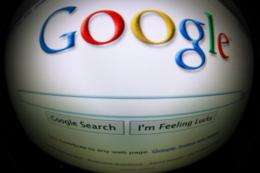Google responds to newspaper critics

Faced with a steady drumbeat of criticism from a shrinking newspaper industry, Google is out to prove that it is friend not foe.
"Please don't shoot. I am unarmed," David Drummond, Google's chief legal counsel, told angry publishers last week at the World Newspaper Congress in India.
Drummond's remarks may have been in jest but they summed up the state of the tense relationship between the Internet giant and a newspaper industry facing an uncertain future in the digital era.
Google has been accused for years of shrugging off the concerns of newspapers while raking in billions of advertising dollars from the Web.
That may be changing.
Drummond's appearance before the World Newspaper Congress was just one of a series of moves made by the Mountain View, California, company last week in a bid to counter its critics.
Google chief executive Eric Schmidt took to the pages of the newspaper owned by his chief antagonist, News Corp. chairman Rupert Murdoch, to defend the Internet giant against accusations from publishers that it is profiting from their content.
"With dwindling revenue and diminished resources, frustrated newspaper executives are looking for someone to blame," he wrote.
Rejecting charges Google was responsible for their woes, Schmidt called for a "change of tone in the debate" and said he wants to "work with publishers to help them build bigger audiences, better engage readers and make more money."
In a peace offering, Google simultaneously announced changes to Google News, its popular news aggregator site that is the target of much of the ire of newspapers for linking to their stories without sharing advertising revenue.
It said publishers could limit to five the number of articles people can access for free through Google search or Google News and gave them the ability to exercise greater control over what content is indexed.
Google argues that it drives traffic to newspaper websites -- as many as four billion clicks a month, according to Schmidt -- and newspapers can easily prevent the search engine from accessing their content if they choose to do so.
Dan Kennedy, assistant professor of journalism at Northeastern University, said Google appears to be backing away from that "black-and-white proposition" of "we're going to include you in our search engine or you can take yourself out."
"It strikes me that Google's saying 'Well, maybe the content providers have a point and we're going to start to offer some shades of grey,'" he said.
Murdoch has threatened to block Google from indexing his newspapers and has reportedly been holding talks with Microsoft about making News Corp. content accessible exclusively through the software giant's new search engine, Bing.
Kennedy said Google's apparent new flexibility may stem from its "utopian vision" of indexing all of the world's information.
"If suddenly they don't have, say, the world's leading 100 newspapers, even if that doesn't have any effect on their bottom line, I think that hurts their image of what they are and what they're doing," he said.
The Wall Street Journal is currently is the only News Corp. title to require a subscription fee but Murdoch has announced plans to begin charging for all of his newspapers on the Web.
Many other newspapers are also considering erecting pay walls around their websites and the tweaks to Google News close a "back door" some readers had been using to access paid content for free.
John Rose of the Boston Consulting Group, which recently conducted a survey on the willingness of consumers to pay for news online, said the changes will not however resolve fundamental problems between search engines and newspapers hoping to charge readers on the Web.
On the one hand, Rose said, readers are willing to pay for some newspapers with a "unique editorial voice or a unique content beat."
But he pointed to "an incredible insoluble tension between search engines and newspapers that are essentially reproducing commodity news information."
"It's not really about the search engines," he said. "It's about the fact that your competitive advantage was the fact that you were only people who printed and distributed news in your market.
"And now people can get that news from someone else, and your competitive advantage has been removed," Rose said. "You can't charge for something that someone else is giving away for free."
The trick is to determine a publication's unique content and charge for access to it, Rose added, warning that "maybe not everybody will survive."
(c) 2009 AFP




















